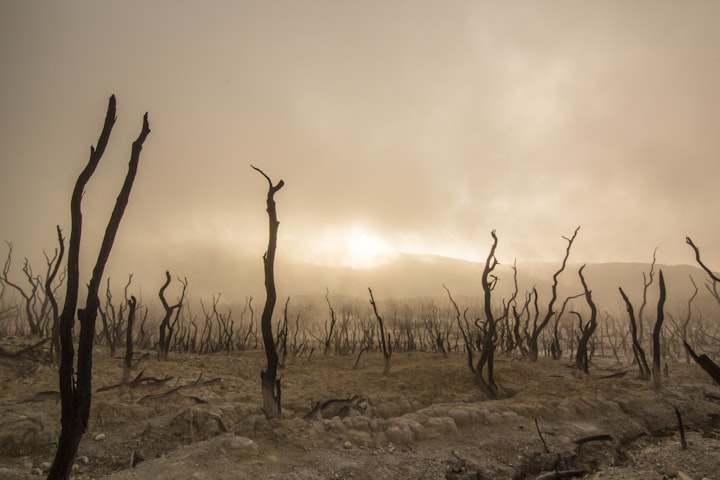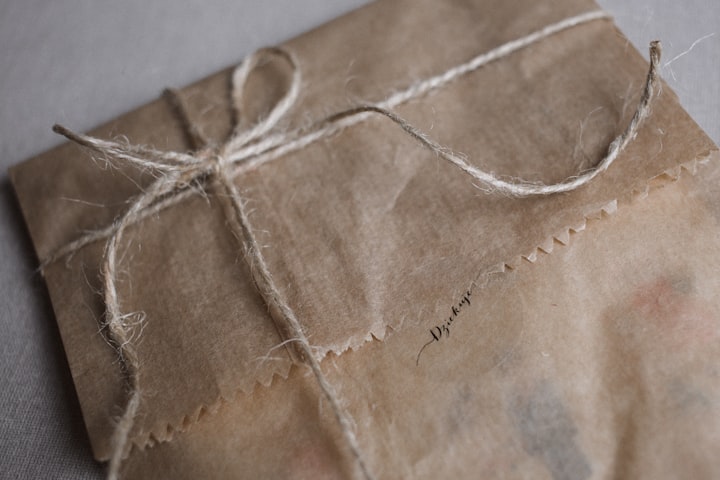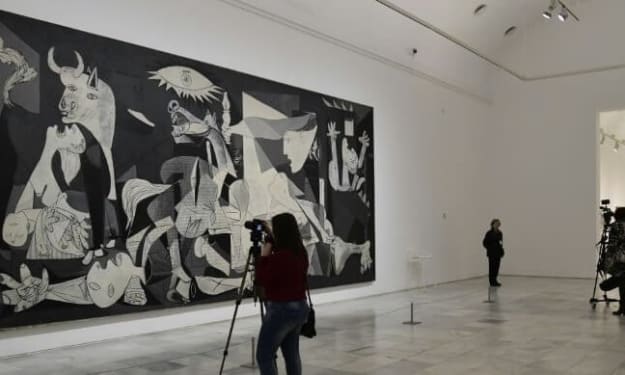The Erasure came when every plant was erased from the surface of the Earth. With no plants to hold the topsoil, the ground turned to dust. The rains were infrequent. The sun was relentless and the wind was fierce. When it did rain, the precipitation was full of the poisons that had accumulated in the atmosphere, made more toxic by the radiation from the sun. The rains came in torrents that made the flat places into a muddy churning and the places below the surface that had sheltered ancestors in the beginning were filled with poisoned water. What people remained took to higher ground.
The Erasure came gradually. It started with the Company encouraging new plants, made in a lab, made to be cheaper to grow, more resistant to insects and drought. They were genetically modified and cultured in a closed-loop of nutrient rich swill. The interdependent creatures that consumed, pollinated, and decomposed plant matter to sustain the land and the system of living things disappeared, species by species.
And then came the Scarcity. There was not enough food to sustain even the smallest of creatures and those at the top of the food chain began to die, too, their bones littering the dusty ground.
With the Scarcity came death and with the death came forgetting until the Erasure was complete. The Company became the Council and forgetting became the law. Remembering was certain death.
****
It was early summer in her garden. The green of the trees and climbing vines surrounded the mossy path. The sunlight made dancing dappled shadows with each breeze that rustled the leaves. The fine grains of pollen, dust and spore sparkled in the shafts of sunlight that pierced the green canopy. Breathing in the smells of rich earth, sweet honeysuckle, green herbs made her dizzy with delight. She wept at the overwhelming beauty of living.
Then came the headache. It was sudden and felt like she had been struck in the head by a rock. The color went out of the world. She gasped for air and could not feel her limbs. She crumpled forward, her mouth open and filling with dirt.
She never knew when the headaches would come or the visions. She didn’t know how or why they happened, but they did, and the visions were always true. She had had them since she was a child. Her mother said it was her legacy, her birthright, to see things and know things. She knew the languages of living things best. This so-called gift was both a blessing and a curse. In this vision, she glimpsed a barren world with hunger and death. A world she was not a part of, except for the heart-shaped locket that contained a lock of her grandmother’s hair. It rested between two flat stones in what was left of the garden wall.
That night she dreamed she followed a scrawny vixen into the underbrush. There were brambles and blackberry canes, vines and roots. They scratched her face and arms and ankles, stinging with every step. It was hard to breathe. She would soon give birth and she tired quickly The fox finally stopped in a grove of mother trees. She curled up on a bed of moss, nested in the embrace of old roots. The fox curled up beside her. Night fell like a black shroud, no moon, stars obscured by low clouds.
The next afternoon a hawk swooped into the garden and then screamed a piercing kee-aaarr. The vixen appeared at the edge of the garden. It was then she remembered the dream and understood she must prepare to leave her home, to follow the fox, for her safety and that of her child.
That night she gathered an assortment of seeds and dried herbs, a blanket, some honey, a flask of wine, and a bit of dried fruit. She wrapped them in a bindle and set it by the door. She reached for the golden heart in a small shrine on the mantel.
It had belonged to her grandmother and her mother after that. Now it was hers, the only object of value that connected her to them. The locket was burnished gold and featured a smaller heart of red stones on the upper right. Her grandmother was a midwife and healer, who came from a long line of wise women. When her grandmother was dying, she instructed her mother to cut a lock of her hair and place it in the locket. When the locket closed, her grandmother closed her eyes, smiled, and breathed her last breath.
At dawn she set out. She turned for one last look at the only home she had ever known and the garden she loved. She tucked the locket between two flat stones in the low, stone wall that delineated the garden’s edge. She followed the river bed to the north, toward the mountains. Mid-morning the fox appeared and led her to a thicket of underbrush, just as she had dreamed,
--
Prim stepped outside of the Institute’s heavy walls. She looked down the hill toward the garden and saw the workers were already harvesting. The workers were children. It was Prim’s job to supervise them. Her father, Dr. Mendel, had bargained with the old orphanage to take them to harvest the produce he created in the lab. With the Scarcity, the orphanage could not grow enough to feed the children and the Institute needed help harvesting.
Dr. Mendel was a world-renowned scientist who specialized in the biological engineering of plants. He had managed to maintain the Institute, his estate and research lab, on land in the high country that had so far avoided the worst impacts of the changing climate that were leading to the loss of plants, animals and habitats further south. The Institute’s location afforded him some insulation from the demands of the Company. Prim was his only daughter. He raised her to be curious, but obedient. She learned quickly and knew how to manipulate her father to get the few things she desired
A murder of crows squawked and cawed, directing Prim’s attention to the edge of the wild land that bordered the Insitutute’s gardens. She detected a small figure moving in and out of the trees. She watched as it lumbered over to the edge of the garden where the workers were gleaning. It was the same size as the youngest children.
Prim watched the creature as it watched the children, bending, picking, putting the beans in the baskets. Its head followed their motions. It was more curious than threatening. Soon, the creature stood upright, moved between two of the younger children and imitated them, bending, picking, putting the beans into the baskets, joining the rhythm of their work.
The children were not afraid of the creature. Prim came closer to the workers each day, observing the creature more closely. It appeared to be a feral girl-child, maybe three or four. Its hair was matted and its skin was brown. It did not speak, yet seemed to understand the work of the children. It seemed to only make animal sounds, chirps and grunts and growls. They were not random, but part of a conversation with the creatures of the nearby forest and field.
Prim welcomed the girl-child’s efforts to increase the harvest. It appeared among the children and disappeared to the forest at its will and did not require anything of Prim, no food, no discipline, nothing. Prim decided its name should be Eve, which was a sound it croaked back in response. When Prim called her, she responded, by saying her own name.
One afternoon, Dr. Mendel peered out of the lab window and noticed that there was an extra worker in the garden. When he questioned Prim about it at supper, she explained that Eve was a. great worker, did not speak and, most importantly, did not require food or a bed in the worker’s cabin. She begged her father to allow her to keep Eve at the Institute, assuring him that Eve slept in the forest and would not be a disruption to production or his work. He could not refuse her.
As the Erasure advanced northward, the garden produced less and Dr. Mendel was pressured to develop more, better plant materials. The other Company labs began to complain of reduced production and an increase in unviable plant materials. In an effort to solve his problems, he went to the garden to see what was working and maybe gain some insights, remember something basic to growing plants in the earth that he had forgotten. He watched Eve, working alongside the others. She gently touched the plants and drew close, breathing on them. Mendel could have sworn he saw the plants lean up to greet her face as a baby does its mother. Impossible, he thought. He called Prim and asked her to bring Eve to the lab.
“Why did you call us here, Father?” Prim asked.
“I have a theory I want to test,” he replied.
They watched as Eve moved up and down the rows of plants. As she passed, the plants turned to her, as if she was the sun itself.
“Do you see that?” Dr Mendel said excitedly.
“Eve has a way with plants. All living things, really. She can call birds to her and wherever she is working in the garden, snakes and earthworms, beetles and butterflies appear.”
Mendel brought Eve to work in the lab. He showed her how to clone the plants, to create new plant materials in the nutrient swill and to separate the little rootlings and place them in the tubes where they would grow larger. Dr. Mendel then decided to teach Eve to extract plant DNA to create new genetic combinations.
“Prim,” he said. “I need you to go into the forest with Eve. I need you to follow her wherever she leads, maybe to her mother or a home. Watch what she eats and bring back the plants that feed her. Do you remember how I showed you to gather seeds and plant specimens in the wild?”
Prim and Eve went into the forest the next morning. Prim noticed that the big, old trees had brown leaves and many were standing and dead. They continued past the dead tall trees and came to a dusty field full of tumbleweeds and brambles. It formed a thick barely permeable mat of what had once been undergrowth. From time to time Eve would fix her gaze along the edge of their path until she found what she was looking for. She gathered berries and sweet grasses that they chewed as they traveled.
Toward sunset they came to a low, stack of stones, once part of a wall. Beyond it was a thick stand of green overgrowth and an old cabin that was being reclaimed by vines. Prim investigated inside the cabin and found scattered parchments and a selection of small bottles filled with seeds. While Prim was inside, Eve investigated the greenery and the garden wall. A glint of metal caught her eye and she found a small, heart-shaped locket between the stones. She rolled it inside her sleeve and hoped it would not be detected.
Dr. Mendel was thrilled by their haul. He was giddy. He stood at the lab table and began to sort the seeds, trying to decipher the faded labels and comparing specimens to references in old books on botanicals. Dr. Mendel left the lab briefly to meet the Company truck with Prim for this week’s tribute. Eve could feel the warmth of the gold locket pulsing in her cuff. She whistled an old song, from a bird long gone, that rose from her own heart and ancestors long passed. Holding the locket brought her many memories, none of her own. She took a piece of silver hair from the locket and placed it in the DNA extractor.
About the Creator
Faye Hanson
I am a teacher and professional storyteller, living between two worlds- in more than one way.







Comments
There are no comments for this story
Be the first to respond and start the conversation.